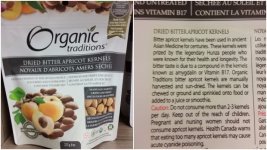David Baxter PhD
Late Founder
Snacking on bitter apricot kernels? You're at risk of cyanide poisoning, Health Canada warns
CBC News
December 6, 2017
Kernels are sometimes marketed as a 'medicinal ingredient'

A bag of dried bitter apricot kernels is for sale in a health food store in Montreal.
(Susan Mckenzie/CBC)
Health Canada says eating "more than a few" bitter apricot kernels puts people at risk of cyanide poisoning.
The seeds found in the pits of apricots are used to flavour foods, but people may also be eating them as snacks, the department said in an advisory issued Tuesday. Bitter apricot kernels are often sold in packages in health food stores, some Asian grocery stores and online, it said.
"Health Canada advises those who choose to consume bitter apricot kernels to limit their consumption to no more than three kernels per day for adults, ground and mixed with other foods," the advisory said.
Children should not eat the bitter kernels at all.
In addition to the bitter kernel, an apricot pit contains a sweet kernel. The sweet kernel does not pose a risk, Health Canada said.
Bitter apricot kernels contain a naturally occurring chemical called amygdalin, often found in a substance called laetrile and marketed as vitamin B17. Amygdalin can release cyanide after it's eaten. The human body can get rid of small amounts of cyanide, Health Canada said, but more than a few of the kernels can lead to toxic amounts.
Bitter apricot kernels are sometimes promoted as a "medicinal ingredient," the advisory said, including false claims that they are a treatment for cancer.
"No health products containing amygdalin (or laetrile or B17) have been authorized by Health Canada to treat cancer or any other condition," the advisory said. "Health Canada does not permit cancer treatment claims for natural health products."
"The use of unauthorized medicinal or natural health products containing this ingredient may result in cyanide poisoning, which could cause death."
Given the threat, Health Canada said, it is "assessing" how bitter apricot kernels are sold.
This is not the first time Health Canada has issued a warning about bitter apricot kernels. In 2009, an information page on the department's website said "at least one Canadian" had been hospitalized.
In November, a man from California told CBC's As It Happens about being treated for potential cyanide poisoning at a Montreal hospital after buying a bag of bitter dried apricot kernels and only seeing the label warning against consuming more than two or three after eating many.
Health Canada has required warning labels on the products since 2009.
Information on how many cases of cyanide poisoning from eating bitter apricot kernels have been reported to Health Canada was not immediately available.
CBC News
December 6, 2017
Kernels are sometimes marketed as a 'medicinal ingredient'

A bag of dried bitter apricot kernels is for sale in a health food store in Montreal.
(Susan Mckenzie/CBC)
Health Canada says eating "more than a few" bitter apricot kernels puts people at risk of cyanide poisoning.
The seeds found in the pits of apricots are used to flavour foods, but people may also be eating them as snacks, the department said in an advisory issued Tuesday. Bitter apricot kernels are often sold in packages in health food stores, some Asian grocery stores and online, it said.
"Health Canada advises those who choose to consume bitter apricot kernels to limit their consumption to no more than three kernels per day for adults, ground and mixed with other foods," the advisory said.
Children should not eat the bitter kernels at all.
In addition to the bitter kernel, an apricot pit contains a sweet kernel. The sweet kernel does not pose a risk, Health Canada said.
Bitter apricot kernels contain a naturally occurring chemical called amygdalin, often found in a substance called laetrile and marketed as vitamin B17. Amygdalin can release cyanide after it's eaten. The human body can get rid of small amounts of cyanide, Health Canada said, but more than a few of the kernels can lead to toxic amounts.
Bitter apricot kernels are sometimes promoted as a "medicinal ingredient," the advisory said, including false claims that they are a treatment for cancer.
"No health products containing amygdalin (or laetrile or B17) have been authorized by Health Canada to treat cancer or any other condition," the advisory said. "Health Canada does not permit cancer treatment claims for natural health products."
"The use of unauthorized medicinal or natural health products containing this ingredient may result in cyanide poisoning, which could cause death."
Given the threat, Health Canada said, it is "assessing" how bitter apricot kernels are sold.
This is not the first time Health Canada has issued a warning about bitter apricot kernels. In 2009, an information page on the department's website said "at least one Canadian" had been hospitalized.
In November, a man from California told CBC's As It Happens about being treated for potential cyanide poisoning at a Montreal hospital after buying a bag of bitter dried apricot kernels and only seeing the label warning against consuming more than two or three after eating many.
Health Canada has required warning labels on the products since 2009.
Information on how many cases of cyanide poisoning from eating bitter apricot kernels have been reported to Health Canada was not immediately available.

